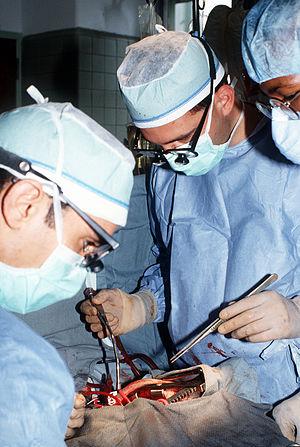
Image via Wikipedia
(Written for a communications class received an A; please leave your comments)
Every relationship has
its communication challenges, however, if a person is ill and there is a
communication problem between the Doctor and Patient –it can be deadly. Patients
and physicians have an obligation to be clear and precise in their communication
to each other, if one or the other fails in their obligation the results can
cause harm or even death. In September of 2005, I had to have a simple surgical
procedure. When the hospital called the day before to give instructions, I asked
them if I should take my daily medications -or wait until after; the nurse
informed me to go ahead and take all medicines as scheduled (she never ask what
kind it was). This was the start of the communication plight between the staff
and me.
Not thinking that most of
the medications were narcotics, I took them all as normal. By the time that I
had reached the hospital in Oklahoma City, it was time to take my second dose of
the day; therefore, once again, I took them as normal. Now laying in the
hospital bed waiting for the anesthesiologist, I was feeling no pain. About
thirty minutes later the nurse came in and administered the sedation –that was
the last thing that I remember, until I awoke in intensive care nine days later.
After coming to, the nurse told me that I had passed away three times –the last
being for over a minute and a half.
The next day the staff
moved me to a regular floor where I stayed another nine days. The doctor that
had done the procedure came into my hospital room and informed me that if I did
not quit taking all those pills it would kill me (at that time I was on 30
different medicines), however, after three years of being on them I was an
addict. For the next week they rehabbed me and got the drugs out of my system;
it was the first time that I had thought clearly in three years. The doctor
stated that he would not put me back on any narcotics –that if I felt pain then
I knew I was alive; at that sober moment, I agreed with him. It seemed that now,
he and I were communicating competently, clearly, with perfect
understanding.
However, the morning that
I checked out of the hospital (21 days after a same day surgery) the nurse
handed me thirteen new prescriptions –all narcotics; the same medicines I had
just overdosed on. I did not understand why he would do that after what just
occurred. I asked the nurse if he realized that he said he was NOT going to give
me any medicines; she stated that he wrote them and told her to give them to me.
As an addict, the thought never crossed my mind to tell her to tell him that I
would NOT take them –I went straight to the pharmacy and filled them; eating two
of each to make up for lost time. By the time that I reached Stonewall,
Oklahoma, I was high on pills again –remaining hooked for another two years.
I often ponder on this
incident, wondering how it could have been handled better –on both sides of the
spectrum; what we could have done differently –I wondered. As for my part of the
communication issue: I should have asked the nurse that told me to take the
regular medications –if that included the narcotics, since they would be putting
me to sleep; instead, I assumed that it meant take all the daily medications.
I have since learned to not assume anything, and that the only stupid question
is –the one unasked! Not communicating competently almost cost me my
life!
Similarly, the nurse
should have asked exactly what kinds of medications that I was taking –but
again, I assumed she knew. It is the hospital staffs’ job to be thorough when
giving instructions and asking pertainate questions from the patient before any
procedure. Moreover, the nurse that administered the sedative should have asked
more questions before putting the medication in my IV –it was obvious that I was
high on something. Furthermore, a detailed list of my medications and allergies
should have been readily available to the hospital staff before surgery was
scheduled, and they should have went over that list with me on the phone when
setting the appointment time (a miss-communication between the doctor and staff
members). This is a policy that should be implemented in every hospital and
doctor’s office across the country –it could save lives.
As far as the doctor is
concerned and his lack of communication skills with staff (both the doctor at
the hospital and my primary physician), should have made it clear that narcotics
should not be taken before this procedure. Additionally, the physicians’ should
have told me as the patient, that I should not take narcotics or sedatives
before any procedure that requires sedation of any type. There were plenty of
opportunities to inform me of what I should or should not do before the medical
procedure; moreover, if it happened in my case, who’s to say that it hasn’t
happened to others –or will in the future.
In conclusion, in a
relationship all parties involved must communicate clearly, competently, and
mindfully. Because, in certain circumstances a breakdown in communication can
cost a life, a love, or even a family member –lost to a complete
misunderstanding. We must all consider the effect that our words and sentences
have on others and the way that they communicate. Finally, simply because one
party walks away satisfied with the conversation does not mean that it was a
competent, clear exchange.

